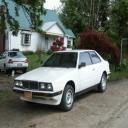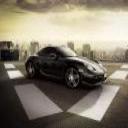Yahoo Answers is shutting down on May 4th, 2021 (Eastern Time) and beginning April 20th, 2021 (Eastern Time) the Yahoo Answers website will be in read-only mode. There will be no changes to other Yahoo properties or services, or your Yahoo account. You can find more information about the Yahoo Answers shutdown and how to download your data on this help page.
Trending News
Porsche 911 Modern Engines?
Why the departure from air-cooled engines? Increasingly stringent emission standards? More efficient fuel consumption? What's your opinion?
5 Answers
- designergenesLv 69 years agoFavorite Answer
It's possible to build a more powerful air-cooled automobile engine than the most powerful street car Porsche ever produced with this technology - the 1997 911 Turbo S (424 HP); however, it requires departing from flat six engine format that Porsche wanted to retain for the 911. Even the 1997 911 Turbo wasn't entirely air cooled: the large standard oil cooler on that car handled a lot of the job.
Emissions too played a part in the switch to an oil and water-cooled 911 instead of an oil and air-cooled one. Emissions limits are more easily met with a water-cooled engine.
Today's Porsche 911s run as high as 620 HP, and even more than that is likely coming. An air-cooled flat six cylinder delivering that kind of power was not in the offing. You've gotta keep up with the Ferraris, Corvettes, Aston Martins, Lamborghinis, etc. if you're Porsche.
Source(s): I'm a long time 911 owner, a Porschephile, a track guy, and a mechanical engineer. The icon is me and my 2005 Porsche 911 Turbo S ... just racing in the rain. - Paul SLv 79 years ago
Some interesting comments so far...
>Water cooled engines last longer...
Just sticking with the topic, it's hard to argue that a yet-to-be-rebuilt 911SC engine with 450k air cooled engine won't last as long as an M86 engine from an early Boxster or 996 Carrera. Aside from that, look at something like a Deutz diesel engine... that's hard to beat in any measure of reliability and longevity. So it's safe to say this is not true in any way; some air cooled engines will last longer than water cooled engines and vice versa.
>Water cooling is newer technology...
It's newer for the Porsche flat 6, in overall terms both are rather old technologies that date to the beginning of the automotive industry. Saying it's "newer technology" deserves a footnote about how the Model T is the pinnacle of modern engineering technology as well. There is nothing remotely "new" about water cooling.
>Porsche was falling behind in production and sales...
Half true... in the mid 1990s Porsche had a huge dip in sales that nearly destroyed the company. However, sales of air cooled 911s kept the company going while production of the water cooled models was the biggest problem at the time. Further, this dip was more related to changing tastes in regard to the water cooled models offered at that time and global economic issues that affected purchasing of luxury items like high end sports cars. And as for production, Porsche had production to spare at the time (moreso since sales were down), and the Porsche factory regularly produced parts and completed vehicles for other German manufacturers during this period. So again, it was neither an issue of sales or production capacity.
>Air cooled can't make enough power...
Yes, the 1500hp air cooled engine from the 917/30 just didn't make enough power! 934? 935? All so terribly under powered. There is absolutely no issue with the amount of power an air cooled engine can make if you are looking at just power. The most powerful engines made by Porsche to date are air cooled engines.
Which brings us to the why... and power does figure into that equation. The genesis of the switch goes back to the 1970s gas crisis when Porsche made the rather bold statement that it would only increase power when it could also increase gas mileage and emissions quality. At this time, Porsche's street offerings were directly on par with offerings from Ferrari and other similar high end competitors. However by the end of that decade you would start seeing a gap with Porsche on the lower side of the power output for this reason.
As you neared the end of that decade too, you have Porsche's first water cooled sports cars being offered, with the internal view of management at the time that they would soon replace the 911 and air cooled models would be a thing of the past. However the buying public had a different opinion, and air cooled 911 models remained the flag ship of the company.
By the time the 1990s rolled around there were two major issues that would affect future designs. First, the company mistakenly believed that the growth they had in the 1980s would continue which led to too much production capacity and overhead just as an economic downturn hit. And second, increasing emissions requirements that were making it impossible to even come close to keeping pace with the power of their competition.
The 986 and 996 models were the company's last shot to avoid being bought (Mercedes and BMW were the likely buyers at the time). This meant a switch to water cooling to make the newer platforms more competitive in power output while meeting those increasingly stringent emission standards (and other tooling to share more parts for cost savings and factory optimization).
That is for the street cars at least... on race cars the issue is somewhat similar, but driven not by emissions but by changing regulations. While the most powerful engines Porsche has built were earlier air cooled race engines, you can go back to just after that and see the advent of water cooled heads and other cooling changes that were required to stay on pace with FIA's rules at the time that placed a premium on improved fuel economy (and smaller engine sizes). As always, these rules have fluctuated over time, but many of the core requirements that were born in this era have remained.
- MotorheadLv 79 years ago
Emissions were the ONLY real factor.
Air cooled is always better because it not only is lighter but can't leak, and is more fuel efficient.
But running hotter also created more NOx exhaust components, which now are illegal.
Which is foolish because water cooled uses more gasoline, so produces more pollution in the long run.
Even though air cooled actually pollutes less, the government essentially made them illegal for new cars.
- C7SLv 79 years ago
The fact is water cooled was the new technology.
Porsche was falling behind in sales and in speed since they were the last to switch to water cooled engines.
Air cooled can only handle so much power. Eventually, they will need more than just air to keep them cool, they need water.
- How do you think about the answers? You can sign in to vote the answer.
- Trump 2020Lv 79 years ago
Liquid cooled engines last longer. They did the same thing with dirt bikes that are raced, and larger motorcycles. Liquid cooling.







